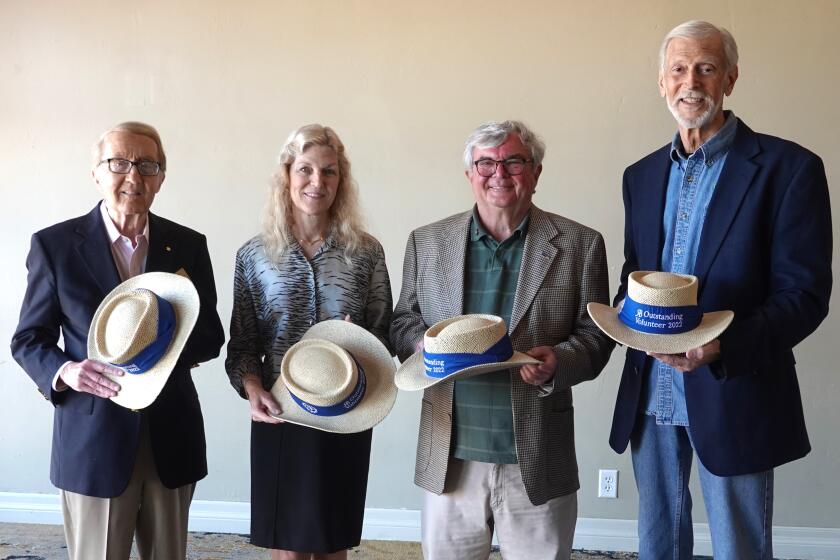San Diego city attorney candidates debate issues
Three of the five San Diego City Attorney candidates faced off in Rancho Bernardo on Tuesday during a debate moderated by termed-out City Attorney Jan Goldsmith.
Democrats Gil Cabrera, an attorney in private practice, and Mara Elliott, a chief deputy city attorney; plus Republican Robert Hickey, a deputy district attorney, participated in the debate during the Conservative Order for Good Government’s luncheon.
Not available to attend were Democrats Rafael Castellanos, an attorney in private practice, and Bryan Pease, a public interest lawyer.
The race is officially non-partisan. The primary will be held on June 7. It is open to registered voters living within the City of San Diego, which includes Rancho Bernardo.
“I’m running because of the opportunity the city faces,” Hickey said during his opening speech. “Are we going to miss it or seize it? I’ll see that we seize it.”
“It is so important for the office that we have stability and someone who understands municipal law,” Elliott said during her opening remarks, citing her years as a lawyer for various government agencies.
“In this office you want someone who is non-political ... somebody to be non-partisan ... (working with) people on both sides of the aisle,” Cabrera said during his opening.
All three said, if elected, that they would be a city attorney in the style of Goldsmith — viewing the city as their client while being accountable to the voters — rather than the style of former City Attorney Mike Aguirre, whom they said saw himself as a representative of the people.
During several questions, Goldsmith posed hypothetical situations that gave the candidates an opportunity to explain how they would fulfill their duties if elected, especially if their legal opinion and what the City Council and mayor ultimately decided to do differed.
In one situation, they were asked if they would go forth with an appeal the council refused to pursue if they felt the council’s decision was detrimental to the citizens.
“It depends on the circumstance,” Cabrera said. “You give advice to your clients, but they do not all pay attention. If the council votes and decides not to appeal it is difficult to go out on your own. I would do it in limited circumstances.”
“You give your best advice and full analysis of the fallout and they make the decision,” Elliott said. “You have to remember the role of the office — to give sound, independent legal advice to our client. You expect (those elected) to act on your behalf.”
“If the policy maker does not want to appeal, you might be stuck not appealing,” Hickey said. “You can lobby in private, but not in public to not embarrass your client. But if it is pension reform passed by two-thirds of voters, then that’s a tougher question because you must be accountable to the voters who passed the initiative.”
All three said the job carries some risk and they would advise their client to the best of their ability and lower the risk of losing cases as much as possible. However, all also said that if the council, for example, sought outside legal advice — advice that they in the role of city attorney deemed illegal — that after carefully considering the other lawyer’s perspective they would not sign off on the action if they were still convinced it was illegal, even if taking such as stand brings criticism upon themselves.
When asked if they saw the city attorney office as a forum for citizens to report problems, each had a varying take.
Hickey said deciding how to act upon the information would be tough, adding, “What I couldn’t do is opine back to the complainer.”
Elliott said she wants to have quarterly community forums and city attorney representatives attend community group meetings so they can hear directly from residents. “If you can be in front of an issue before it blows up, you can take a proactive approach,” she said.
As one of only two citywide elected officials (the other is mayor), Cabrera said he would have an open door policy, but not take on an ombudsman role. He would pass on information to policy makers, adding, “You must be careful because you’re the city’s lawyer ... so you must be very mindful of the potential conflicts this creates.”
When it comes to releasing police body camera footage, all said they believe in transparency and would advocate forming a policy that clearly states when footage can become available to the public, adding earlier is better.
Regarding former Councilwoman Donna Frye’s push for public access to officials’ government-related emails on their private accounts, all three said there are easy ways to head off the issue and promote transparency. The easy solution, they said, is for everyone to forward work-related voicemails and emails received at their private accounts to their work accounts and respond from the latter. They would also remind the sender that the message went to the wrong phone number or email address.





